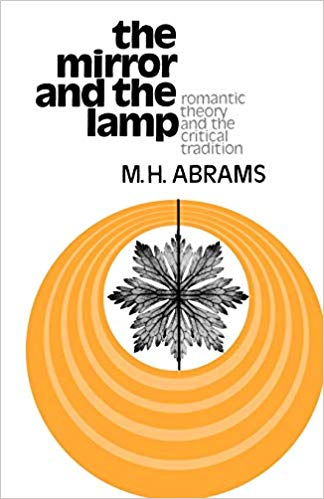
I finally finished M. H. Abrams’ The Mirror and the Lamp. I should have read it twenty years ago when I was studying Romantic poets (the big 6) at Victoria College. The title gives it all away. It presents two antagonistic metaphors for poetic creation. On the one hand is the classical understanding of the poetic act as one of mimesis—portraying (or reflecting) what already exists in the world. The principal criterion of poetry is the extent to which it accurately portrays the real world. On the other hand, the metaphor of the lamp suggests an expressive poetry, one that arises from within the poet and adds something entirely new to the real world. This second (and romantic) view of poetry has, as its criterion, the extent to which it accurately reflects the poet’s depth of feeling or authenticity.
The book’s importance, for me, is that it points to a fundamental theme in all human understanding. That is: we can do nothing, whether it be writing poetry, rearing children, burying our dead, or eating a meal, we can do none of this without satisfying our primary need—the need for meaning. And, we satisfy our other primary need—the need to live in community—by conveying our gleanings of meaning in the only way we have at our disposal. This is the metaphor. We understand nothing without metaphor, and we convey nothing of our understanding without metaphor.
However, the metaphor contains an inherent danger. We often fall into the trap of co-opting the metaphor as a source of meaning rather than as a tool for conveying meaning. A simple example: since the beginning of love poetry, or so it seems, poets have used the rose as a metaphor for the beauty of their love’s object. But others have seized upon the fact that roses have thorns and have used this fact to express a cynical view of such expressions of love. But if the lover made no allusions to thorns in his poem, is it legitimate to impute to such a poem the existence of thorny roses simply because roses do, in fact, have thorns?
Admittedly, this is an innocuous example and a seemingly abstruse question. But identical logic has been used to justify genocide. That is why an understanding of language and its creatures, like poems and metaphors, is essential.